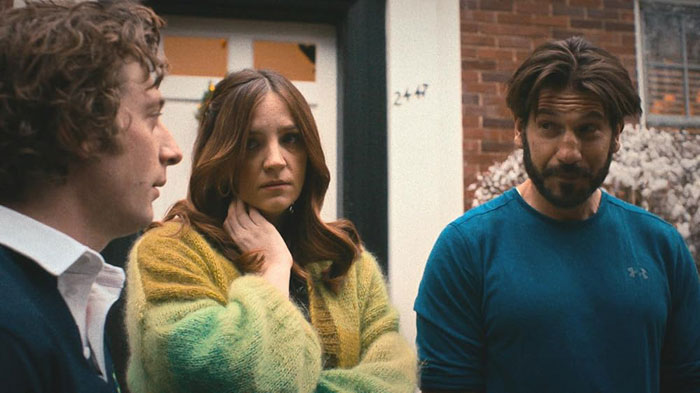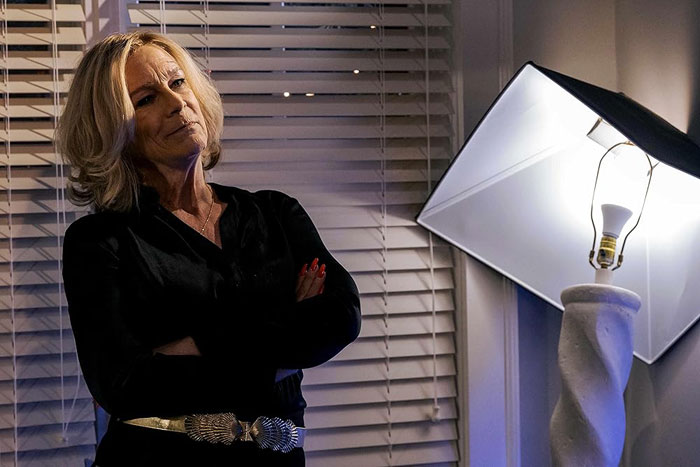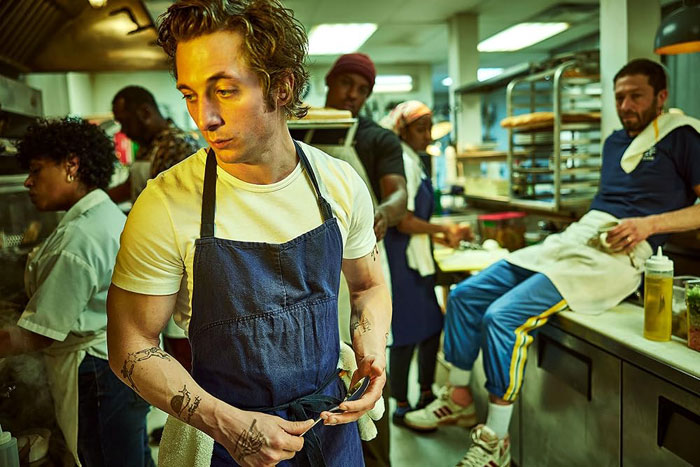|
Of
all the countless
reasons to mourn the
premature,
self-inflicted death of
Anthony Bourdain,
Christopher
Storer and his
colleagues have added
one more: Bourdain
never got to see
The Bear.
Bourdain would have loved The Bear, and
he almost certainly
would have appeared in
it; as have so
many of his friends
(Thomas Keller, Daniel
Boulud, Grant Achatz,
Wylie Dufresne).
But, even more, The Bear is
a paean—albeit a
fraught and profane
one--to the restaurant
business and the people
who are attracted to it.
Roadrunner, Morgan
Neville's documentary,
contains a clip of
Bourdain greeting his
staff and delivery
persons at New York's
Les Halles as they
arrive exactly on
time.
"It's why all chefs are
drunks," he says.
"We don't understand
why the world doesn't
work like our kitchens."
Storer offers a corrective to Bourdain. The Bear is
more like a scene in
Fellini's And the Ship Sails On, depicting
the chaos in a cruise
ship kitchen versus the
calm elegance of the
dining room. The Bear's kitchen
is exactly like the
world, only more
hectic. Stoves
catch on fire, plates
get dropped, deliveries
are late and/or wrong,
health inspectors are
rigid and unfriendly,
staffers sneak into the
alley to smoke
crack. What
Storer shows is that
chefs like Carmen
"Carmy" Berzatto
(Jeremy Allen White) aspire to
have a kitchen that is
a haven from the
world. Carmy
regards the creation of haute cuisine as
a sacrament, as Season
3, Episode 1, titled
"Tomorrow," makes
plain. In Carmy's
ideal kitchen he finds
respite from the
pandemonium that has
always warped his
life. We see that
pandemonium
encapsulated in the
immediately preceding
episode, in
which—during the
grand opening of The
Bear's eponymous
restaurant—he is
trapped for hours in
the kitchen's walk-in
refrigerator. And
that is by no means the
worst thing that
happens.

At the beginning of The Bear, Carmy—a Michelin-starred, James
Beard Award-winning chef in New York—is forced to come home
to Chicago to take over his family's failing Italian beef sandwich
shop. He inherited it from his brother Mikey (Jon Bernthal), who
committed suicide. The building is crumbling, the equipment is
antiquated, the toilet is chronically broken, the staff is surly and
disorganized, the business is deeply in debt, and Jimmy "Cicero"
Kalinowski (Oliver Platt), a longtime family friend and financial
backer, is calling in his loan.
The Bear is, at least ostensibly, the story of how Carmy transforms
the business into a destination restaurant with a beef sandwich
carryout on the side. But it is about so much more. It is about
how Carmy wins hearts and minds to his project, and exactly who
these hearts and minds are. Eventually, in Season 3, it becomes a
meditation on why people become chefs. Without too much strain
, one could even say The Bear is about why people live.
The characters in The Bear are among the most complex in
television history, and—with very few exceptions—among the
most lovable. I could write an entire column about any of them,
starting with Carmy. Carmy isn't always lovable, but he is always
deeply sympathetic. The product of a strife-ridden home and his
abusive training by sadistic master chef David Fields (Joel
McHale), Carmy is driven to achieve perfection in all things. He
borrowed his motto. "Every Second Counts," from Chef Andrea
Terry (Olivia Colman), but his attempts to live that
motto—including his list of "27 Non-Negotiables"--drive his staff
crazy.
Driven especially crazy are Richie Jerimovich (Ebon Moss
-Bachrach), the restaurant's manager, and Sydney Adamu (Ayo
Edebiri), Carmy's sous-chef. Richie, a classic Chicago tough guy,
was Mikey's best friend and sees Carmy as a bossy twerp. (A week
-long training session with Chef Terry, in the Season 2 episode
titled "Forks," changes Richie's perspective enormously.) Sydney,
an earnest young chef living with her protective father (Robert
Townsend), wants desperately to excel. She is grateful for
Carmy's tutelage and feels a real bond with him, but yet he makes
her feel slighted.
Line chef Tina Marrero (Liza Colon-Zayas), the angriest of all at
the beginning, calms down after Carmy signifies his respect for
her. In Season 3, Episode 6, titled "Napkins," we learn why Tina
would be especially upset at Mikey's death. Baker Marcus Brooks
(Lionel Boyce) is a quiet, nice guy grieving for his mother, who is
in an irreversible coma. Carmy sees great promise in Marcus and
sends him to study in Copenhagen with master pâtissier Luca
(Will Poulter). Carmy's pregnant sister Natalie (Abby Elliott),
nicknamed "Sugar" because she once confused sugar and salt in a
recipe, is reluctantly pulled in to do the books. Handyman
-turned-waiter Neil Fak (Matty Matheson) and his brother Ted
(Ricky Staffieri) are sweet-hearted bumblers beloved especially
by Sugar and by Claire "Claire Bear" Dunlap (Molly Gordon),
Carmy's on-again, off-again girlfriend.

There are many other characters, but special mention must be
made of Donna Berzatto (Jamie Lee Curtis), the family's hard
-drinking matriarch. We first meet Donna in Season 2, Episode 6,
titled "Fishes," which takes place about five years before Carmy
opens The Bear. Donna is making the traditional "Seven Fishes"
Christmas dinner. The effort clearly overwhelms her, but she
refuses all help. The episode, a model of superb writing, acting,
and editing, tells us a great deal about the Berzatto family and the
problems sundering it. It also proves—if Everything Everywhere
All at Once hadn't already done so—that Curtis exceeds both her
parents as an actor.
"Fishes" shows us what a toxic influence Donna has had on her
children. Mikey is bluff, charismatic, bullheaded and at least as
troubled as his mother. Sugar, wanting only family peace and her
mother's love, instead draws her mother's ire. Carmy is subdued,
detached, wanting only to flee. The episode builds to an
unbearable level of tension, ending in disaster. It is, in my
opinion, the greatest television series episode ever.
Unbearable tension is a hallmark of The Bear. But so is humor,
warmth, and humanity. Scenes such as Sydney making an omelet
for Sugar are as unforgettable as Donna crashing her car into her
house. Fans of the show argue constantly over whether it is
comedy or drama. Personally, I see it as something similar to
what Balzac called the comedie humaine-- an immersive
experience that contains within its precincts everything from the
hilarious to the lachrymose.
It is axiomatic in The Bear that Carmy and his fellow chefs believe
what they do is essential, as Thomas Keller says in Season 3,
Episode 10, titled "Forever."
"We cook to nurture people," Keller tells Carmy on his first day of
apprenticeship at The French Laundry. "We get to be part of
people's lives in significant ways."
Just about everybody, cook or not, reveals a nurturing side in The
Bear. The notable exception is Chef David, whom Carmy
confronts in "Forever" about how he screwed him up. To say
Chef David—who can't remember Carmy's name—is unapologetic
is an understatement.
"You came to me an okay chef, and you left an excellent one," he
says. "So—you're welcome."

Carmy is already reeling from the shock of Chef Terry closing her
beloved restaurant, significantly called Ever, where he and so
many of his staffers trained. As she explains to Carmy, she just
wants a life, and feels she has no more to accomplish as a
restaurateur.
"I got to do all the things I wanted to do, the way I wanted to do
them, with the people I wanted to do them with," she says. "You
can't ask for more, really."
All of this leaves a great deal for Carmy to consider, just as he
receives a message on his iPhone. The anticipated, dreaded
moment has arrived—publication of the Chicago Tribune review
of The Bear.
"Mother-fucker!" Carmy exclaims, and that is where we leave
him. There are eight more episodes of The Bear, scheduled for
release in June 2025, in which we will find out what the review
says, and presumably learn the resolution of all the plotlines left
dangling throughout Season 3. In any case, whatever happens in
those episodes would almost certainly have been familiar to
Anthony Bourdain. The Bear tells us that—in life as in
restaurants—Every Second Counts.
|